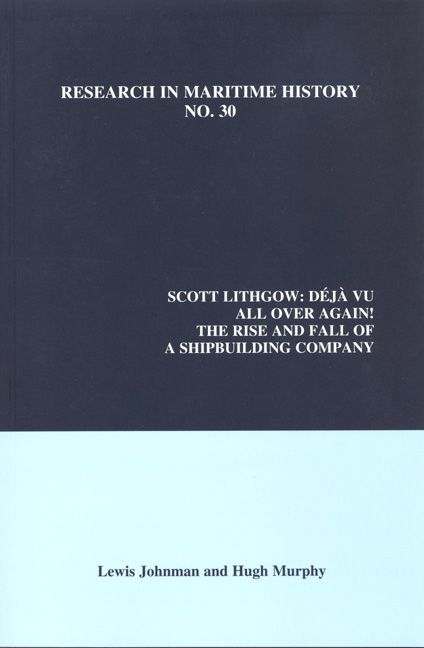Book contents
- Frontmatter
- Contents
- Acknowledgement
- Introduction
- Chapter 1 Scotts of Greenock, 1711-1945
- Chapter 2 Russell and Company to Lithgows Limited, 1874-1945
- Chapter 3 Scotts Shipbuilding and Engineering, 1945-1965
- Chapter 4 Lithgows Limited, 1945-1965
- Chapter 5 The Long March to Merger, 1965-1970
- Chapter 6 The Road to Nationalisation, 1970-1977
- Chapter 7 Nationalisation to Privatisation, 1977-1984
- Chapter 8 Déjà vu All over Again: Trafalgar House, 1984-1988
- Chapter 9 Conclusion
- Appendix
- Bibliography
Chapter 8 - Déjà vu All over Again: Trafalgar House, 1984-1988
- Frontmatter
- Contents
- Acknowledgement
- Introduction
- Chapter 1 Scotts of Greenock, 1711-1945
- Chapter 2 Russell and Company to Lithgows Limited, 1874-1945
- Chapter 3 Scotts Shipbuilding and Engineering, 1945-1965
- Chapter 4 Lithgows Limited, 1945-1965
- Chapter 5 The Long March to Merger, 1965-1970
- Chapter 6 The Road to Nationalisation, 1970-1977
- Chapter 7 Nationalisation to Privatisation, 1977-1984
- Chapter 8 Déjà vu All over Again: Trafalgar House, 1984-1988
- Chapter 9 Conclusion
- Appendix
- Bibliography
Summary
It had already been made clear to British Shipbuilders (BS) in the run-up to privatisation that Trafalgar House had been keen for some time to become a major player in the large offshore structures market. The future success of Scott Lithgow, which had become almost entirely geared to offshore construction, hinged in the short term on delivering Sea Explorer and, crucially, the Britoil semi-submersible, Ocean Alliance, on time and to budget in the spring of 1986. Not only would this go some way to re-establish the yard's already badly tarnished reputation in the offshore community, it would also be a vindication of privatisation. From the outset, however, Trafalgar House had no experience in either the drill ship or the complex semi submersible market and was ultimately reliant on the BS view of Scott Lithgow's capability to complete its outstanding contracts. Nevertheless, Trafalgar did secure the technical cooperation of experienced Howard Doris’ staff to complete Ocean Alliance on schedule. With the tantalising prospect of future submarine orders, combined with the government's desire to privatise the warship firms, it would have been commercially inept had Trafalgar not considered the naval dimension of Scott Lithgow as being equally important. If, for example, the firm could either win a refit or make a successftd bid for the follow on orders for the new Type 2400 conventional submarines, it could re-establish its reputation in the domestic market and become the alternative supplier to the lead yard, Vickers. Indeed, even if Scott Lithgow failed to do so, Trafalgar House could still use the yard as a launching pad to allow it to bid for other soon-to-be-privatised warship builders, such as Yarrow or Vickers, with their virtual monopolies over frigate and conventional and nuclear submarine construction, respectively.
All this was ultimately dependent on political considerations. At a price of £12,000,000 Trafelgar had purchased Scott Lithgow rather cheaply. A statement from Howard Doris, which was expected to purchase a quarter of the shares, explained that the £12,000,000 would equate to the net asset value (the aggregate value of the share capital and reserves) of Scott Lithgow. BS, however, had already spent £13,000,000 at Scott Lithgow in additional capital expenditure on offshore work alone. In the event, an allotment of 27,500,000 ordinary shares in Scott Lithgow was made to BS on 28 March 1984 on a renounceable letter of allotment in two parts.
- Type
- Chapter
- Information
- Scott LithgowDéjà Vu all over again! The Rise and Fall of a Shipbuilding Company, pp. 305 - 342Publisher: Liverpool University PressPrint publication year: 2005



